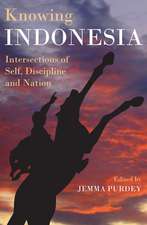Understanding Ethnic Media: Producers, Consumers, and Societies
Autor Matthew D. Matsaganis, Vikki S. Katz, Sandra Ball-Rokeachen Limba Engleză Paperback – 17 aug 2010
Preț: 563.08 lei
Preț vechi: 731.27 lei
-23% Nou
Puncte Express: 845
Preț estimativ în valută:
107.74€ • 112.80$ • 89.15£
107.74€ • 112.80$ • 89.15£
Carte tipărită la comandă
Livrare economică 07-21 aprilie
Preluare comenzi: 021 569.72.76
Specificații
ISBN-13: 9781412959131
ISBN-10: 1412959136
Pagini: 336
Dimensiuni: 178 x 254 x 16 mm
Greutate: 0.59 kg
Ediția:1
Editura: SAGE Publications
Colecția Sage Publications, Inc
Locul publicării:Thousand Oaks, United States
ISBN-10: 1412959136
Pagini: 336
Dimensiuni: 178 x 254 x 16 mm
Greutate: 0.59 kg
Ediția:1
Editura: SAGE Publications
Colecția Sage Publications, Inc
Locul publicării:Thousand Oaks, United States
Recenzii
"This
comprehensive
book
offers
a
global
overview.
The
rich
data
discussed
and
the
activities
proposed
make
a
very
good
introductory
text
for
ethnic
media
teaching.
The
organization
of
the
material
is
excellent
and
the
writing
is
particularly
engaging
and
confident,
and
brings
the
subject
to
life."
"This is an excellent contribution to a growing body of important literature."
Understanding Ethnic Media: Producers, Consumers and Societiesaddresses important media outlets that are often absent from academia and professional discussions of mass media. In light of the momentous changes within today’s societies, and with the many challenges faced by governments unsure of multiculturalism, the need for this text at this time could not be greater. … This much-needed book offers a wonderful overview and identifies areas in need of further exploration.
This book is definitely a must-read for all teachers and students in the field of media and ethnic minorities or those professionals planning to play a role in ethnic media development.
The book offers a rich smorgasbord of discussion, covering immigrants’ media, minorities’ media, audience trends, ethnic media organizations, and policy development. … The book abounds in small, substantive nicities that would make it appealing to a wide base of readers. … Overall, it is a valuable textbook for the growing field of ethnic media studies.
The study of ethnic media is complex terrain. Matsaganis, Katz, and Baii-Rokeach's new book thankfully provides clear, sharp analysis of the processes that shape media produced by ethnic communities and for ethnic communities. It is a useful starting point for students, policy makers, media practitioners, and academics, one that is grounded in a thorough practical knowledge of newsroom mechanics, the tensions created by market competition and tight budgets, and wider technological shifts in production and consumption.
"This is an excellent contribution to a growing body of important literature."
Understanding Ethnic Media: Producers, Consumers and Societiesaddresses important media outlets that are often absent from academia and professional discussions of mass media. In light of the momentous changes within today’s societies, and with the many challenges faced by governments unsure of multiculturalism, the need for this text at this time could not be greater. … This much-needed book offers a wonderful overview and identifies areas in need of further exploration.
This book is definitely a must-read for all teachers and students in the field of media and ethnic minorities or those professionals planning to play a role in ethnic media development.
The book offers a rich smorgasbord of discussion, covering immigrants’ media, minorities’ media, audience trends, ethnic media organizations, and policy development. … The book abounds in small, substantive nicities that would make it appealing to a wide base of readers. … Overall, it is a valuable textbook for the growing field of ethnic media studies.
The study of ethnic media is complex terrain. Matsaganis, Katz, and Baii-Rokeach's new book thankfully provides clear, sharp analysis of the processes that shape media produced by ethnic communities and for ethnic communities. It is a useful starting point for students, policy makers, media practitioners, and academics, one that is grounded in a thorough practical knowledge of newsroom mechanics, the tensions created by market competition and tight budgets, and wider technological shifts in production and consumption.
Cuprins
Preface
PART I: ETHNIC MEDIA IN CONTEXT
1. What Are Ethnic Media?
Introduction
Defining Ethnic Media
The Role of Geographic Context
The Roles of Ethnic Media
Globalization and the Ethnic Media
Social Changes That Make Studying Ethnic Media Necessary
Chapter-by-Chapter Book Overview
2. The Ethnic Media in History
Emigration, Immigration, and the Ethnic Media
Beginnings of the Ethnic Press in Europe
Ethnic Media in the United States
Ethnic Media in Canada
Ethnic Media in Mexico
Ethnic and Immigrant Media in Australia
How the Past Affects Present Ethnic Media Trends
PART II: THE CONSUMERS
3. Immigrants and Their Media
Why Immigration Matters
Context of Reception
Ethnic Media as Resources for Immigrants
4. Ethnic Minorities and Their Media
What Is an Ethnic Minority?
Ethnic Media's Roles in Ethnic Minority Communities
The Challenge for Ethnic Media to Remain Viable
PART III: THE PRODUCERS
5. Ethnic Media Audience Trends and What Lies Behind the Numbers
Ethnic Newspapers: The Importance of Circulation Audits
Ethnic Television and Radio: Trends and Politics Behind the Ratings
Trends in Print Media Circulation
The Audiences of Ethnic Television and Radio
6. Ethnic Media Organizations and Competition
Surviving Competition, Achieving Sustainability
Competing for Advertising Revenue
Challenges and Opportunities for Ethnic Print Media
The Internet as a Substitute for Ethnic Print Media
Competition in Ethnic Television and Radio
Ethnic Television, Ethnic Radio, and the Internet
Online-Only Ethnic Media
The 2008 Global Economic Crisis: Catalyst for Innovation or Demise?
Satellite Broadcasting Networks
7. Globalization and the Ethnic Media Organization
The Structure of Ethnic Media Organizations
What is Globalization?
Forces of Globalization
Six Types of Ethnic Media Organizations
Who Owns the Ethnic Media?
8. Policy and Ethnic Media Development
Governance and Ethnic Media
Policymaking in a Globalizing World
The Broader Policy Context of Ethnic Media Development
Media Policy Provisions and the Ethnic Media
Immigrant Versus Indigenous Ethnic Cmmunities
Public Service Broadcasting and Ethnic Media
Public Access to the Airwaves, Open Channels, and Restricted Service Licenses
Deregulation and the Internet
PART IV: ETHNIC MEDIA AS CIVIC COMMUNICATORS
9. Ethnic Media as Local Media
Ethnic Media and the Communities They Serve
Geo-Ethnic Media and Civic Engagement
Geo-Ethnic Media and Community Health
Geo-Ethnic Media Challenges
10. Professional Challenges for Ethnic Media Journalists
The Ethnic Media Journalist in the 21st Century
Who Are the Ethnic Media Journalists, Editors, and Staff?
Journalists as Conduits to the Larger Community
Challenges Ethnic Media Producers, Editors and Reporters Face
Professionalization: Objectivity and Social Responsibility
When the Ethnic Community Turns Against Its Ethnic Media
Ethnic and Mainstream Media Collaborations: Experiments, Possibilities, Challenges
The Role of Professional Journalism Education in the Future of Ethnic Media
PART V: THE FUTURE OF ETHNIC MEDIA
Conclusions: What Does the Future Hold for Ethnic Media?
How the Experts See the Future of Ethnic Media
Ethnic Media and Emerging Technologies: Opportunity or Risk?
The Future of Ethnic Media: The Consumers
The Future of Ethnic Media: The Producers
Gaps in the Research: What Do We Still Need to Know to Understand Ethnic Media?
References
Author Index
Subject Index
About the Authors
PART I: ETHNIC MEDIA IN CONTEXT
1. What Are Ethnic Media?
Introduction
Defining Ethnic Media
The Role of Geographic Context
The Roles of Ethnic Media
Globalization and the Ethnic Media
Social Changes That Make Studying Ethnic Media Necessary
Chapter-by-Chapter Book Overview
2. The Ethnic Media in History
Emigration, Immigration, and the Ethnic Media
Beginnings of the Ethnic Press in Europe
Ethnic Media in the United States
Ethnic Media in Canada
Ethnic Media in Mexico
Ethnic and Immigrant Media in Australia
How the Past Affects Present Ethnic Media Trends
PART II: THE CONSUMERS
3. Immigrants and Their Media
Why Immigration Matters
Context of Reception
Ethnic Media as Resources for Immigrants
4. Ethnic Minorities and Their Media
What Is an Ethnic Minority?
Ethnic Media's Roles in Ethnic Minority Communities
The Challenge for Ethnic Media to Remain Viable
PART III: THE PRODUCERS
5. Ethnic Media Audience Trends and What Lies Behind the Numbers
Ethnic Newspapers: The Importance of Circulation Audits
Ethnic Television and Radio: Trends and Politics Behind the Ratings
Trends in Print Media Circulation
The Audiences of Ethnic Television and Radio
6. Ethnic Media Organizations and Competition
Surviving Competition, Achieving Sustainability
Competing for Advertising Revenue
Challenges and Opportunities for Ethnic Print Media
The Internet as a Substitute for Ethnic Print Media
Competition in Ethnic Television and Radio
Ethnic Television, Ethnic Radio, and the Internet
Online-Only Ethnic Media
The 2008 Global Economic Crisis: Catalyst for Innovation or Demise?
Satellite Broadcasting Networks
7. Globalization and the Ethnic Media Organization
The Structure of Ethnic Media Organizations
What is Globalization?
Forces of Globalization
Six Types of Ethnic Media Organizations
Who Owns the Ethnic Media?
8. Policy and Ethnic Media Development
Governance and Ethnic Media
Policymaking in a Globalizing World
The Broader Policy Context of Ethnic Media Development
Media Policy Provisions and the Ethnic Media
Immigrant Versus Indigenous Ethnic Cmmunities
Public Service Broadcasting and Ethnic Media
Public Access to the Airwaves, Open Channels, and Restricted Service Licenses
Deregulation and the Internet
PART IV: ETHNIC MEDIA AS CIVIC COMMUNICATORS
9. Ethnic Media as Local Media
Ethnic Media and the Communities They Serve
Geo-Ethnic Media and Civic Engagement
Geo-Ethnic Media and Community Health
Geo-Ethnic Media Challenges
10. Professional Challenges for Ethnic Media Journalists
The Ethnic Media Journalist in the 21st Century
Who Are the Ethnic Media Journalists, Editors, and Staff?
Journalists as Conduits to the Larger Community
Challenges Ethnic Media Producers, Editors and Reporters Face
Professionalization: Objectivity and Social Responsibility
When the Ethnic Community Turns Against Its Ethnic Media
Ethnic and Mainstream Media Collaborations: Experiments, Possibilities, Challenges
The Role of Professional Journalism Education in the Future of Ethnic Media
PART V: THE FUTURE OF ETHNIC MEDIA
Conclusions: What Does the Future Hold for Ethnic Media?
How the Experts See the Future of Ethnic Media
Ethnic Media and Emerging Technologies: Opportunity or Risk?
The Future of Ethnic Media: The Consumers
The Future of Ethnic Media: The Producers
Gaps in the Research: What Do We Still Need to Know to Understand Ethnic Media?
References
Author Index
Subject Index
About the Authors
Descriere
A
relevant
and
timely
book
with
a
unique
approach:
the
focus
here
is
onhowandwhyethnic
and
racial
minorities
produce
and
consume
media
for
themselves
-
not
just
how
they
are
represented
in
or
by
the
media.











